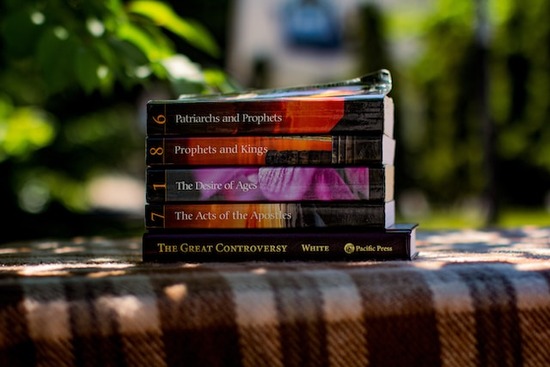Do Seventh-day Adventists have their own Bible?
Adventists have some unique beliefs—you might be able to name some of them right now.
The seventh-day Sabbath as a day of rest, remembrance, and worship.
Death as a “sleep” in the grave, instead of the soul consciously living on in heaven or hell.
Hell as nonexistence, instead of eternal torture.
So where did these beliefs come from? What Bible verses are they based on?
And, do Adventists use a different version of the Bible, or have their own version?
No, Adventists don’t have their own Bible. We use the same Bible translations that other Christian and Protestant denominations use.
But we understand your confusion, so let’s unpack the answer here. We’ll cover:
Why Adventists don’t have their own Bible
As Adventists, we don’t have our own Bible translation because we believe that the canon of the Bible as it exists today—both the Old Testament and the New Testament—is the reliable and unchanging Word of God. It was cherished, protected, and passed down to us through the ages, and we value it as the foundation of all our doctrines and teachings. Through it, God communicates with us by the Holy Spirit and points us to Jesus Christ.
We highlight this in our fundamental belief #1.
Here’s how the General Conference of Seventh-day Adventists puts it in an official statement1:
“The Holy Scriptures stand as the infallible revelation of God’s will, the norm for Christian values and life, the measure of all things within human experience, and the sole reliable guide to salvation in Christ.”
During the Reformation, Protestants called this philosophy sola scriptura—the Bible and the Bible alone. It means that the Bible is our ultimate authority and guide.
And, since Adventists indeed uphold the Bible in this way, we need to address some of the misconceptions that have cropped up about this.
Why do people think Adventists have their own Bible?
Even though Adventists don’t have their own Bible, people may think that for a few reasons:
- Our unique doctrines and beliefs
- Our use of Ellen G. White’s writings
- The Clear Word paraphrase
Our unique doctrines and beliefs
Adventists have many similar beliefs to other Christians—salvation by faith in Jesus; the Second Coming of Jesus at the end of the world; heaven, where Jesus will take His followers at the Second Coming; and more.
But some of our beliefs are unique, such as the seventh day as the Sabbath; death as a sleep in the grave until Jesus returns; and Jesus’ work in the heavenly sanctuary. These beliefs involve a different interpretation of certain Scriptures than you might have heard before.
But these Adventist beliefs come from the same Bibles most Christians are already familiar with, such as the King James Version, English Standard Version, or the New International Version, to name a few.
Our use of Ellen G. White’s writings

Photo by Emmanuel Phaeton on Unsplash
Adventists accept the writings and teachings of Ellen G. White as a product of the biblical gift of prophecy (Romans 12:6; 1 Corinthians 12:28). As a result, people wonder if we treat her writings as Scripture.
We don’t. The Bible instructs us to “test everything [and] hold fast what is good” (1 Thessalonians 5:21, NKJV). This means checking whether what we’re reading or learning aligns with the Bible. In this way, we test Ellen White’s writings—just like we would any other books or materials. And that alone shows that her prophetic writings are not the authoritative standard. Rather, her books were written to encourage further Bible study and assist fellow Christians in applying Scripture to daily life.
The Clear Word paraphrase
In 1994, Jack Blanco—a theology professor at Southern Adventist University—published a paraphrase of the Bible called The Clear Word, basing it on thoughts he wrote during his own personal Bible study. This book’s fast-growing popularity caused it to be misrepresented as a Bible, leading people to think that it was an Adventist translation, similar to the Book of Mormon or the Jehovah’s Witnesses’ New World Translation.
But a quick look at the book’s preface of the 2004 edition says otherwise:
“The Clear Word is not a translation, but a devotional paraphrase of Scripture expanded for clarity…. It should not be considered a study Bible. Excellent translations of the Scriptures are available for such purposes.”
It is a devotional tool with an Adventist interpretation of Bible texts—but it was never meant to be used as the primary source for Bible study or worship services. Jack Blanco himself never wanted people to take it as such.
And the Seventh-day Adventist Church has never claimed it is a Bible, as stated by Dr. Jud Lake, an Adventist theologian who wrote a paper about The Clear Word.
When this book was first published, it became popular with those wanting help and encouragement while studying trickier parts of Scripture. Due to this, it became a frequent resource at small group Bible studies and more. But regardless of how this devotional book was originally described or circulated among individual Adventists or local congregations, Dr. Lake clarified,
“. . .The Clear Word is not a translation, nor is it a study Bible. . . . This devotional paraphrase, therefore, is intended for private devotional reading only. It is not for serious study, teaching, preaching, or public reading of Scripture.”2
This paraphrase was the thoughts of one man, commenting on the Bible. It can never be equal to a Bible.
What are different Bible translations, and what do Adventists use?
All Bible translations that exist today can fit into three different categories: literal, dynamic equivalents, and paraphrases. These translations are all based off of the original Greek and Hebrew texts copied and passed down through the centuries.
The official Adventist Church doesn’t officially have a preferred translation, and its members use and own a variety. It’s common for people to own multiple versions for study purposes. Let’s learn more about them.
Literal translations

Photo by Tim Wildsmith on Unsplash
Literal translations of the Bible aim to translate the Hebrew and Greek texts as directly as possible. For this reason, they are sometimes called word-for-word translations.
Examples of literal translations are:
- The King James Version (KJV)
- The New King James Version (NKJV)
- Young’s Literal Translation (YLT)
Many people, Adventists included, prefer literal translations for in-depth Bible study because they tend to be closest to the original text.
Dynamic equivalents
Dynamic equivalents, also known as thought-for-thought or meaning-to-meaning translations, are all about conveying the message of the text, rather than the exact words. Sometimes the same words can have different connotations in different languages, cultures, or periods of history. So the translators of these versions made sure to consider the historical and cultural background of the text so it could best be expressed in modern terms, while preserving the intent of the Bible writers.
Dynamic equivalents include:
- The New International Version (NIV)
- The Good News Translation (GNT)
- The New Living Translation (NLT)
- The Revised English Bible (REB)
- The Contemporary English Version (CEV)
Paraphrases
Paraphrases focus on interpreting the Bible text rather than merely expressing what it says. Thus, they don’t fit the definition of a Bible translation and should be used as study aids, not Bibles.
Some paraphrases are:
- The Living Bible
- The Message
- The Clear Word
And if a paraphrase seems to assert a different idea than you find in a Bible translation, it’s wise to consider the Bible as the standard, not the paraphrase. Some who own paraphrases of the Bible have many different ones, so they can also compare between them as well.
To give you an idea how different translations affect the text, here’s a comparison of 1 Corinthians 13:4 between literal, dynamic, and paraphrases.
| Literal (New King James version) | Dynamic (New International Version) | Paraphrase (The Message) |
| “Love suffers long and is kind; love does not envy; love does not parade itself, is not puffed up.”3 | “Love is patient, love is kind. It does not envy, it does not boast, it is not proud.”4 | “Love never gives up. Love cares more for others than for self. Love doesn’t want what it doesn’t have. Love doesn’t strut, Doesn’t have a swelled head.”5 |
What about the Seventh-day Adventist Bible Commentary?
The Seventh-day Adventist Bible Commentary is just that—a commentary. It’s not a Bible and doesn’t claim to be. Instead, it’s a verse-by-verse analysis of the Bible, put together by theologians to help Adventists in their study.
Adventists use the SDA Bible Commentary in the same way that other Christians might use well-known commentaries like Matthew Henry’s Commentary or The MacArthur Bible Commentary.
Again, the Bible must be our standard to test the teachings of the commentary—not the other way around.
Adventists cherish the same Bible other Christians do
The Adventist Church began with people from various Christian denominations—Baptist, Congregationalist, Methodist, etc. When these individuals started Seventh-day Adventism, they brought the Bible with them because they wanted it to be their foundation.
That hasn’t changed. We still use the same Bibles that Protestant Christianity uses.
Again, the Bible must be our standard to test the teachings of the commentary—not the other way around.
Adventists cherish the same Bible other Christians do
The Advent Movement, which eventually became the Adventist Church, began with people from various Christian denominations—Baptist, Congregationalist, Methodist, etc. When these individuals started Seventh-day Adventism, it was because they felt that it was necessary for Christians to continue studying the Bible to discover new things and new applications of its timeless truths.
That remains our priority to this day. The Bible alone is the foundation of our faith, and there’s always more we can learn from it. And it’s an essential part of getting to know Jesus more deeply.
- “The Holy Scriptures,” General Conference of Seventh-day Adventists, https://www.adventist.org/official-statements/the-holy-scriptures/. [↵]
- Lake, Jud, “The Seventh-day Adventist Church and The Clear Word,” http://www.ellenwhiteanswers.org/media/pdf/Clear-Word-Ratz.pdf. [↵]
- “1 Corinthians 13:4,” Bible Gateway, https://www.biblegateway.com/passage/?search=1+corinthians+13%3A4&version=NKJV. [↵]
- “1 Corinthians 13:4,” Bible Gateway, https://www.biblegateway.com/passage/?search=1+corinthians+13%3A4&version=NIV. [↵]
- “1 Corinthians 13:4-7,” Bible Gateway, https://www.biblegateway.com/passage/?search=1+corinthians+13%3A4&version=MSG. [↵]
More Answers
What is the Concept of “Present Truth” and Why is it Important?
Present truth is the principle that certain biblical truths are relevant to God’s people at specific times in history. God sends the Holy Spirit to reveal truths that help us better understand how to interpret and apply His Word in a present moment.
What Does the Bible Say About Modesty
The Bible teaches that modesty, a form of humility and respect, is a valuable quality in everyone—men, women and children. It has to do with how we present ourselves, which should exemplify our inner relationship with God.
13th Sabbath Offering: What It Is and Why It Matters
On the last Sabbath of every quarter, Adventist churches participate in the 13th Sabbath offering—a special offering that goes to mission fields around the world.
Adventist Movies: Where Faith and Film Meet
The Seventh-day Adventist Church’s mission from the beginning has been to share God’s truth in the Bible. And as times have changed, we’ve explored new ways of doing this—one of those being movies.
Everything You Need to Know About an Adventist Church Potluck
Every so often, usually on a schedule ranging from once a week to once a month to once a quarter, an Adventist church will have “fellowship dinners,” often casually referred to as potlucks.
How to Join the Seventh-day Adventist Church
Whether you heard about the Seventh-day Adventist Church through a traveling evangelist, during your online searches, or through a loved one or relative, you might be considering joining yourself.
How Do Adventists Make Movie and Music Choices?
We have entertainment at our fingertips. With just a tap on our smartphones, we can access all the latest movies, music, YouTube videos, and more.
Do Adventists Celebrate Birthdays?
Yes, most Seventh-day Adventists do celebrate birthdays because we see them as excellent reminders of the life God has blessed us with. And we celebrate them the same way everyone else does—with friends, family, presents, and a special meal.
Are Seventh-day Adventists Christians?
Yes, the Seventh-day Adventist Church is a Protestant Christian denomination formed in 1863. Just like other Christians, we believe that Jesus Christ is our Savior and seek to follow the principles of the Word of God.
Do Seventh-day Adventists Believe in the Secret Rapture
The secret rapture belief asserts that the followers of Jesus will be suddenly and stealthily “raptured” from earth and taken to heaven. Then, any people left on earth will face a period of great difficulty—before Christ’s second coming actually happens.
The Seventh-day Adventist Hymnal
The Seventh-day Adventist Hymnal is a songbook used worldwide by many Adventist congregations during their worship services. Since its publication in 1985, it has helped foster praise to God while reminding church members of our mission and drawing them closer to Jesus.
Do Adventists Celebrate Communion and Foot Washing?
Like many Christian denominations, Adventists regularly participate in communion, also referred to as the “Lord’s Supper” or the “Last Supper.” They also practice foot washing (John 13:1-20), or the “ordinance of humility,” during the service—which isn’t as common.
How do Adventists choose what to eat?
Every day, parents go through the ritual of getting their kids to eat what is healthy and good while trying to steer them away from what can hinder the growth of their developing bodies. Nutritionists work with their clients to make better food choices.
What Are Seventh-Day Adventist Sermons Like?
In nearly every Seventh-day Adventist Church, the sermon is the focal point of the main service—similar to many Protestant Christian denominations. It is a time of biblical instruction by the pastor, who shares what they’ve been studying in the Bible and preparing over the previous week.
Didn’t find your answer? Ask us!
We understand your concern of having questions but not knowing who to ask—we’ve felt it ourselves. When you’re ready to learn more about Adventists, send us a question! We know a thing or two about Adventists.
















